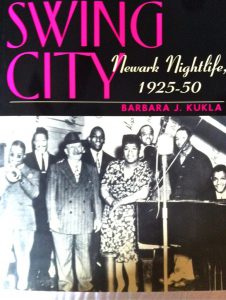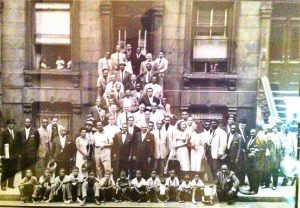Hi lovely Earthlings!
This week we get into another aspect of Alice’s life. She was a leader and a public speaker in educational events about the Afro American cultural heritage. Her scrapbook reports some of the talks she prepared. Here’s one where an introduction is followed by poetry and music. Who should be ashamed of slavery? Alice’s presentation begs the question. Again, we are present to an inclusive voice that embraces all of the Afro American heritage, that looks at history as a flow. Not a tale of winners and losers, but rather a sense of creativity, of music, dance, ritual, song, of feeling life pulsating together as we overcome odds. Perhaps this is the art of living after all.
Two voices are present: Alice and her husband Harold. He is the musician who accompanies the song. The pictures refer to the African American music scene in New Jersey in the early 20th Century of which he was part.
Theme
Exploring Our Afro American Heritage
From the mountains of West Virginia to the farmlands of Pennsylvania
From the West Coast to the East Coast
From the South to the North
They came and they kept coming
And they kept signing, playing music.
Beating the drums to freedom.
African Americans–survivors of a spiritual people–people who made it out of the trials and tribulations of Slavery.
We are here today to explore that history through music.
It is a rich heritage that will not be denied
That must be fortified, restored, built up in our young people for future generations.
Black folks have a strength that has survived racism, depression, recession, and genocide–all designed to steal, kill, and destroy them. The term of “we shall overcome” aptly describes their perseverance.
Our Program today depicts thought “music” pictures from whence we have come and will point out a direction for others to follow.
To show where we are going.
I would like to take you back to the period when slavery existed–a regression for black people–a time when the only thing that kept them going was faith in God. Music became an integral part of their day to day existence–the Negro Spirituals became a coded message used to signal that the master was coming–notify them of a meeting tonight–to “steal away”–meet secretly in old barns, people’s home, anywhere they could pray and ask God to deliver them from the bondage of slavery–strong faith sustained them.
 |
| Recent study of Newark’s black music scene |
During the 19h Century Gospel songs were sung in the Black churches–Gospel meaning “Good News.” Webster’s Dictionary defines Gospel music as African American music–combining spirituals, Blues and Jazz–isn’t it strange that each type of music is distinct in its own right? Spirituals are sacred songs also called jubilees, folk songs, shout songs, sorrow songs, slave songs, slave melodies. Gospel music added another facet, they became religious songs used in church to lift the spirit. Even though Blues and Jazz were performed in the clubs and honky top bars–this music also came out of the souls of black folks and contributes to the Black Heritage.
Alice: “I want to first show you a picture of role models who motivated me–my mother was the one who pointed me in the right direction–even though she died when I was nine years old. Those formative years have stayed with me throughout my life. I have always felt her presence guided me, teaching me–at the time I didn’t know it but God was with me and through his guidance my mother was there–I wasn’t a ‘motherless child'”–play the song.
Harold: “What and who motivated Him.” Talks about beginnings of boycott in Montgomery.
After he finishes, Alice to continue with poem “Troubled Water”–do spiritual “Wade in the Water.”
Today we all face a new type of slavery, a modern type of bondage–destruction of the family–no matter what the color or race of people. Drug addiction has taken its toll. Again, we must all work together in unity to break the bonds of slavery and be free.
Friday, February 26, 1999
Notes from the scrapbook of Alice E. Van Pelt, published here with permission from her descendants, gratefully acknowledged.
Dear Earthlings:
Did you notice the wisdom of these words? Yours truly remembers when she first moved to the United States. She lived with emigres in California. African Americans were definitely her first American friends. So warm, so welcoming, so magical in their ways of being together. She felt privileged to be accepted by them. Never treated like a “foreigner.” What moves me in these notes is Alice’s mention of her late mother, the model she offered, the spirit who lingered on to protect the little girl. And her final note: whose “family” is she talking about? Is it the normative, nuclear family, the family of all African Americans, or perhaps the human family? And drugs? What drugs is she talking about? The drugs that medicalize the lives of seniors and other people with chronic illnesses to the point of making conscious death a more sustainable choice? The drugs that infest the streets of the poor and replace the hope for an education that only money and privilege can access? The drugs that kill one’s creativity rather than enhance it? When I read Alice’s poems without the prejuduce against monotheism, all kinds of meanings and interpretations are open.

More poems from Alice coming. Stay tuned for next. We will post every Monday at noon.
Did you enjoy the post? Let us know! Yours truly appreciates your attention. The comments box is open.
Come back! And stay tuned for more wonders.
Namaste,
Serena Anderlini-D’Onofrio, PhD
Gilf Gaia Extraordinaire
University of Puerto Rico, Mayaguez
Follow us in the social media





http://polyplanet.blogspot.com









